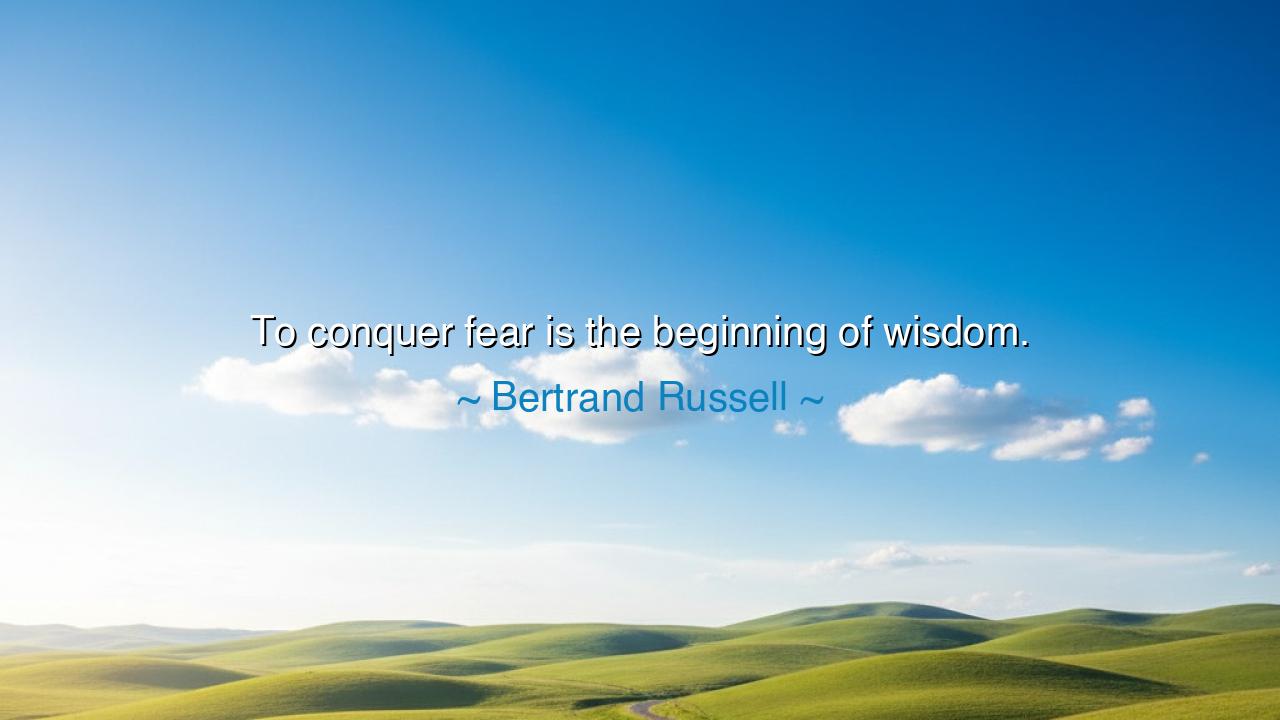
To conquer fear is the beginning of wisdom.






"To conquer fear is the beginning of wisdom." Thus declared Bertrand Russell, philosopher and seeker of truth, whose words carry the strength of a sword cutting through the fog of human frailty. For fear is the first tyrant, the hidden chain that binds the mind. It blinds reason, stirs panic, and drives men to folly. Only when one dares to master fear does the eye of the soul open, and in that opening, true wisdom is born.
The ancients too proclaimed this law. The Stoics taught that fear enslaves, making men tremble before death, poverty, or the judgment of others. Epictetus, once a slave himself, taught that he who conquers fear cannot be conquered by any master. For what can the world take from a man who has stripped fear from his heart? Such a man stands unshaken, dwelling in the fortress of wisdom.
History gives us the tale of Martin Luther King Jr. In the face of threats, imprisonment, and certain death, he chose not to bow to fear. By conquering it, he spoke with a calm voice that shook empires. His courage spread like fire, awakening his people, teaching them that wisdom and justice are born only when fear is silenced. Had he trembled and remained silent, the chains of oppression would have endured longer.
So too in the life of Socrates. Brought before the judges of Athens, accused and condemned, he looked death in the eye without fear. By conquering it, he revealed a higher wisdom: that death is no evil to the just man, but only a passage. His calmness turned the bitterness of his enemies into eternal testimony, and his name lives still, while theirs have crumbled to dust.
Therefore, let this truth endure for all generations: before you may gain knowledge, you must first strike down fear. For knowledge without courage is brittle, easily broken, but wisdom born from courage is eternal. Remember, children of tomorrow: he who trembles remains blind, but he who conquers fear begins to see. And in that sight, he walks not as a slave, but as a master of himself and a bearer of wisdom.






NTVu Nhu Thao
In leadership contexts, I worry about performative toughness. Teams can mistake swagger for clarity and steamroll prudent concerns. How do managers foster brave action that still respects base rates, checklists, and dissent? I’d like concrete moves: pre-commit to decision criteria before anxiety spikes, assign a rotating “chief skeptic,” and run simulations that reward speaking up. What metrics show we’re getting better—fewer near misses, faster recovery, richer postmortems—without drifting into recklessness dressed up as courage?
NNnhan Nguyen
There’s a philosophical tension here. Many traditions warn against letting dread steer choices, yet they also prize humility—acknowledging limits, honoring caution. How do we avoid turning steadiness into arrogance? I’d love a rubric distinguishing courage from denial: Are we informed, value-aligned, and open to disconfirming evidence? Do we set guardrails and consent to consequences? Please sketch a stance that respects vulnerability as a teacher while still freeing us to act decisively when hesitation becomes a cage.
AMAn Minh
From a neuroscience angle, I’m curious: when someone becomes steadier under pressure, what actually changes? Is it reappraisal skill, interoceptive accuracy, or just habituation? How would we measure progress beyond vibes—heart-rate variability, startle response, decision quality after a stressor? I want a perspective on training the body and mind together: exposure ladders paired with recovery practices, reflection logs for metacognition, and clear indicators that resilience is building rather than merely numbing sensation.
LSLee Sunny
I’m thinking about civic life. Public discourse is often flooded with alarm—crime waves, cultural collapse, existential threats. If people temper fear before forming opinions, would we see more thoughtful policy and fewer reactionary swings? Or does some apprehension help mobilize necessary change? I’d appreciate a take on calibrating collective emotion: how journalism, education, and community rituals could reduce panic without dulling urgency, and how citizens can self-check when rhetoric is trying to hijack their amygdala.
MDHa Minh Duc
Practically speaking, what does mastery look like in everyday life? I’m imagining a simple protocol: name the fear precisely, do a tiny exposure, harvest a lesson, adjust the plan. Does that map onto cognitive-behavioral evidence, or are there better routines—like pre-mortems, breath training, or values-based commitments? I’d love a minimal weekly template (ten minutes, tops) that nudges competence upward while keeping the nervous system regulated and the learning loop tight.